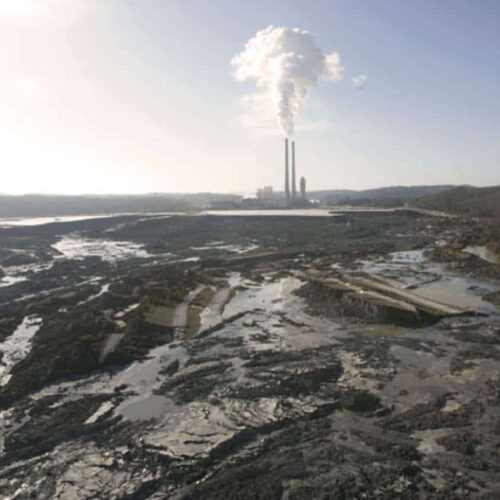Introduction
For months now, political pressure has mounted against the U.S. Environmental Protection Agency’s efforts to regulate for the first time the disposal of coal ash — an environmental hazard fouling water supplies and threatening communities across the country. The impact of coal ash has been highlighted by the Center for Public Integrity in a series of stories.
This week, the pressure on regulators took a new turn as two Republican congressmen inserted language in a must-pass spending bill that would stop the EPA from moving forward to protect the public and the environment from the hazards of coal ash.
Reps. David McKinley of West Virginia and Cliff Stearns of Florida say they added the language because of concerns about lost jobs and other consequences of overregulation.
In the last election cycle, from 2009 to 2010, Stearns took in $54,000 in campaign contributions from energy companies — half from electric utilities that would be affected by EPA regulations for coal ash. During his 2010 campaign, McKinley received $43,300 from energy companies, and $22,751 of that came from mining interests, according to the Center for Responsive Politics.
In May, after months of behind-the-scenes jockeying by utility lobbyists and environmental advocates over the EPA’s proposal, the agency unveiled a 563-page blueprint that would in effect classify coal ash as “hazardous” under federal waste law, triggering a series of strict controls for its dumping. A second option included in the EPA plan would deem coal ash “non-hazardous,” which would subject it to less stringent national standards. Instead of imposing rules, under this option the EPA would issue guidelines for state regulators.
A February 2009 investigation by the Center revealed the threats of coal ash on the environment and human health near ponds, landfills, and pits. In November, the Center spotlighted the toll coal ash has taken on citizens in Ohio, Pennsylvania, and West Virginia who live in the shadows of one of the nation’s largest coal ash ponds — Little Blue Run, owned by First Energy. Coal ash, the residue in the production of electricity, typically is dumped in unlined or partially lined sites near the more than 500 coal-fired power plants nationwide.
Spending Bill Moving Quickly Through House
Stearns and McKinley, whose West Virginia district includes towns surrounding Little Blue, attached separate language limiting the EPA’s power to a Republican-backed bill that would cut funding for the federal government from March 4 through the rest of fiscal 2011. Both provisions would block the EPA from using its funding to regulate coal ash as a “hazardous” waste or material through September, the end of the current fiscal year.
McKinley’s amendment crafted the strongest language, stating that “None of the funds made available by this Act may be used by the Environmental Protection Agency to develop, propose, finalize, implement, administer, or enforce any regulation that identifies or lists fossil fuel combustion waste as hazardous waste subject to regulation.”
Environmental advocates say the two amendments would effectively force the EPA to maintain the status quo. That leaves regulation of coal ash to the states, which advocates complain has led to the “poisoning” of water supplies and health among people living near coal-ash dumps.
“Congress is trying to make the decision for EPA and is ignoring the public process,” said Emily Enderle of Earthjustice, which supports the agency’s proposal to beef up standards. “They’re overreaching and essentially alienating the public, a lot of which are their constituents.”
Thousands of people showed up, some by the busload, to testify at a series of all-day hearings last fall on the EPA’s proposal. And thousands more — including utility executives, scientific experts, environmental advocates, state regulators, and industry lobbyists — have submitted written comments in response to the plan. The EPA says it has received over 450,000 comments on its proposal, which it is currently evaluating.
Lawmakers Say Coal Ash Can Be Recycled
Stearns is among 31 members of the House Energy and Commerce Committee who sent a letter to EPA Administrator Lisa Jackson last July opposing the tougher approach to regulating coal ash. He wants to stop EPA’s work on the coal ash regulation and to recognize “the many beneficial uses of coal ash, and to prevent the loss of jobs and an increase in energy costs,” said spokesman Paul Flusche.
In a statement, McKinley said he sought to prevent the EPA from over-regulating coal ash, which he called “a great recyclable material.” The EPA plan, he said, failed to include a sufficient economic analysis of the extent to which regulating coal ash “would send jobs overseas, put us at an economic disadvantage; hinder job growth and … not protect American jobs.”
The EPA, in its current proposal, has said the cost to consumers and to the recycling industry would be negligible.
“As a former small business owner,” McKinley said, “I understand that this amendment is necessary to ensure private sector jobs will be able to create and sustain business and further our economic recovery.”
The EPA declined to comment on what impact the spending bill language could have on its rulemaking process. Instead, the agency released a White House statement from Tuesday that threatened to veto a spending bill “that undermines critical priorities or national security through funding levels or restrictions, contains earmarks, or curtails the drivers of long-term economic growth and job creation while continuing to burden future generations with deficits.”
The House is on track to approve a fiscal 2011 government funding bill by the end of this week, but it faces opposition from the Democratic-controlled Senate. Lawmakers are expected to reach a compromise before the March 4 deadline to avoid a government shutdown.
Earlier this week, the EPA told the Center that it has yet to make a final decision on how to regulate coal ash disposal.
But that hasn’t assuaged environmental advocates, who have been busily lobbying House lawmakers this week on the coal-ash language as well as more than a dozen other amendments attached to the GOP spending plan that they say could erode environmental protections.
“It seems inevitable that the House bill will have a lot of bad amendments,” said Earthjustice’s Enderle, the legislative director. “But we’re hopeful the Senate will push through a clean bill, so all these bad amendments will be fixed and never land on the president’s desk.”
CORRECTION — 2/17/11: In an earlier version of this story, contributions to the candidates were incorrectly stated in millions, rather than thousands.


Join the conversation
Show Comments